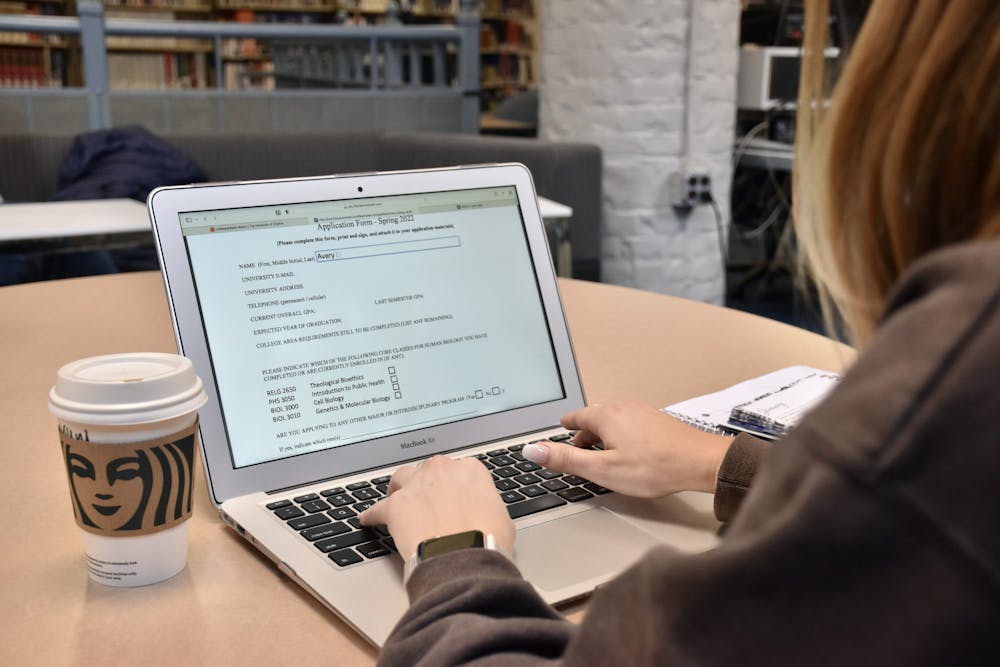For the second year in a row, students applying for selective majors and schools are doing so during a pandemic. This year, students are concerned about the impact of limited extracurricular involvements on their application strength and being unable to get a sense of application-based programs without in-person recruitment.
Many students at the University have the option to apply into application-based majors and schools. Application cycles typically running from early winter to late spring during second year. For this year’s cycle, the Batten School of Leadership and Public Policy’s application closed Jan. 28, while the McIntire School of Commerce’s application closed Jan. 12. Additional programs, such as Political and Social Thought for example, do not collect applications until early March.
Second-year College student Carter Morgan is applying to both McIntire and Batten and has so far not seen the impacts of the pandemic during the process itself. However, Morgan worries about the strength of his application regardless.
“I think communication through emails and prerequisite classes has been helpful and COVID-19 hasn’t really impacted the actual application process,” Morgan said. “However, because of COVID, I haven’t been as deeply involved in as many clubs as I would’ve wanted to be, so I’m worried that is going to impact my application strength.”
Second-year College student Kinsey Clements didn’t share Morgan’s sentiments about the application process, but said she appreciated efforts to give students the space to explain how the ongoing pandemic impacted their applications.
The Commerce application, for example, consists of a set of prerequisite courses, a place to discuss extracurricular activities and awards and a set of questions, one of which is specifically designed for those who took courses using a credit/general credit/no credit option. The University decided to allow this grading system starting in spring 2020 in reaction to the onset of the pandemic. The policy stayed in place until spring 2021.
“I think that it was definitely more challenging to think about majors and applying to them amongst COVID-19 because it felt like we didn’t have the same resources and experiences previous students did,” Clements said. “But it was nice that the application, at least to McIntire, included a question asking about challenges faced during COVID-19 and how that might’ve affected our grades and learning.”
Similar to McIntire, Batten now encourages students to use an optional addendum section at the end of its application to provide context on how the pandemic impacted their lives.
Despite moving outreach efforts such as major advising and general information sessions — which typically take place in-person — online last year due to the COVID-19 pandemic, Commerce admissions officers still recorded a "modest" increase in applications, per Sadie Royal Collins, director of undergraduate admissions at McIntire.
Despite a chance to explain the reasons behind taking classes credit/general credit/no credit in the application, students like second-year College student Camille Weinberg worry that having classes online last year may have made it hard to get a full picture of what each program entails.
“Applying for selective majors this semester is especially nerve wracking because last year we weren’t able to get a great feel for what specific majors might really be like,” Weinberg said. “Personally, I feel like having online classes created misconceptions about what the major might actually be like and closed some doors to options I may have liked, had we been in person.”
Anne Carter Mulligan, director of undergraduate admissions for Batten, said she thinks the pandemic could have restrained some students’ options when applying to selective programs like Batten, which requires students applying to upload a resume, write two 250-word essays, get two letters of recommendation and upload their unofficial transcripts.
“The pandemic underscored our collective need for ethical, resilient, effective policy leaders more than ever,” Mulligan said. “In this spirit, we reduced barriers to application wherever we could, and I don’t think anything that we’ve cut is coming back.”
Like other programs outside of the College of Arts and Sciences — such as the School of Architecture, School of Engineering and School of Nursing — undergraduates in Batten pay more than they would if they stayed in the College. Per Batten’s website, in-state tuition and fees for the 2021-22 academic year was $28,000. In comparison, tuition and fees total $20,118 for an in-state third-year student in the College.
The substantially higher costs may have posed a deterrent for some students and their families as negative economic effects were realized.
“I suspect the pandemic constrained student’s choices when thinking about options – for example, because of economic circumstances, maybe Batten’s differential tuition was more of a deterrent than in years past,” Mulligan said.
However, the Commerce School’s in-state cost is $44,766, and the school saw no corresponding drop in applicants. Mulligan had another theory as to why applications could have dipped slightly.
“Because many students struggled with online learning, perhaps they were unwilling to take on the added stressor of applying to a competitive major,” Mulligan said. “As a result of this, I think we’ll continue to see the effects of the pandemic on our applicant pool for many years to come.”
Decisions for Batten typically come out in early March, while McIntire decisions are released at the end of February.







